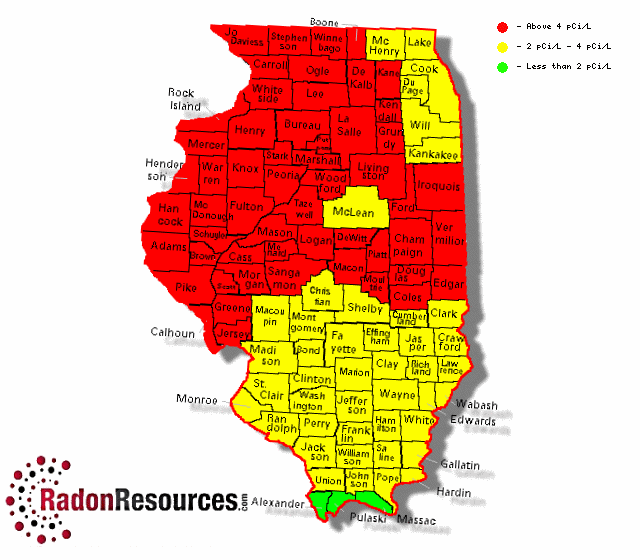Illinois Radon Information
Illinois Radon Program:
Radon Website: WebsiteRadon Contact: Patrick Daniels
Active Radon Program: Yes
Require License for Radon Professionals: Yes
Illinois Radon Levels
Illinois has a user submitted radon level of 7.51. This is based on data submitted from visitors on our site. Learn more here.
EPA Radon Levels
Illinois has 102 counties and 56 (55%) have been assigned Zone 1 counties by the EPA. Zone 1 counties have the highest potential to have homes test higher than 4 pCi/L. Illinois's state radon zone average is 1.48, which is the average of all county zone ratings the EPA has assigned the state, ranking it 16 among all states.
As you can see by the information listed above, the radon levels in the state of Illinois are above average. That means there’s an increased risk for all homeowners, which is why we recommend testing exposure levels at least twice a year.
Illinois Radon Mitigation Services
Looking for professional radon mitigation services in Illinois? Learn how radon affects homes statewide, review metro-level radon data, and get connected with qualified mitigation professionals serving your area.
View Illinois Radon Mitigation Guide
Illinois Radon Map

Zone 1 (1): Potential for radon levels above 4 pCi/L according to EPA
Zone 2 (2): Potential for radon levels between 2 pCi/L and 4 pCi/L according to the EPA
Zone 3 (3): Lowest EPA level with expected radon levels at or below 2 pCi/L
Disclaimer: It is strongly recommended that all households, schools and office spaces test radon levels individually. The EPA Radon Zone data is not an indicator of individual test results, but a guideline for strategic planning. Toxic radon levels can be found in all counties, regardless of their zone rating. While we make efforts to keep this information up to date, it is derived from thirdparty sources which may not be accurate or reflect the most current statistics.
About Illinois
Considered by many to be a microcosm of the entire country, Illinois is the 25th most expansive state and the fifth most populous. The state also has a very commendable Radon program, dedicated to educating citizens about the risks associated with the deadly gas. According to the Illinois Radon program, 118,447 homes across the state were tested and more than 41 percent were found to have elevated levels above the recommended action point. Furthermore, the U.S. IEMA estimates nearly 1,200 Illinois citizens die from radon-related lung cancer each year. Long story short, it’s a pretty serious problem throughout the entire country – let alone just one state. You can find more information on Radon, testing and mitigation at the official Illinois government page.
